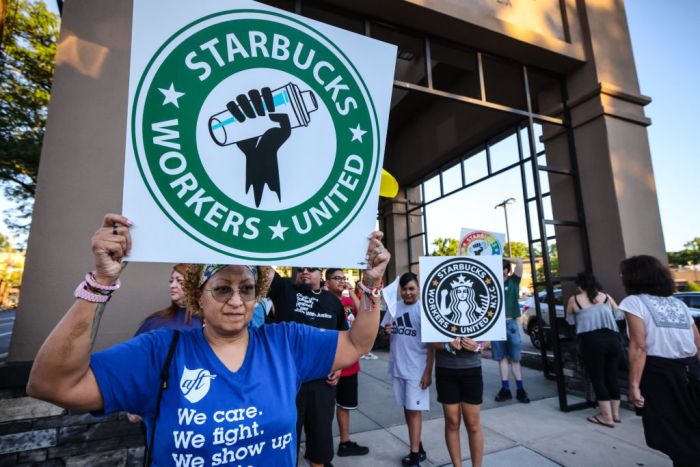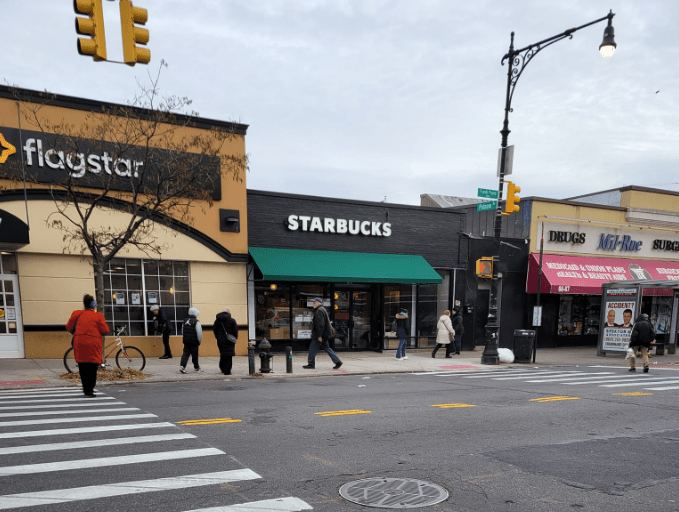Starbucks baristas at the Fresh Pond Road location in Ridgewood filed a petition for a union election on Wednesday, Feb. 19, officially joining a rapidly growing movement of baristas across the country pushing for better workplace protections.
The baristas are seeking to unionize in order to advocate for core issues such as living wages, respect, racial and gender equity, and fair scheduling.
“I’m unionizing so my partners and I have a fighting chance,” said Sam Cornetta, a shift supervisor at Starbucks for four years.
“We are tired of living paycheck to paycheck, being told we’re not doing enough, and feeling as though our jobs are always on the line. Our new CEO, Brian Niccol, made $96 million in his first four months with this company. Starbucks can afford to do better.”
The petition was filed with the National Labor Relations Board (NLRB), making the Fresh Pond Road location part of a wave of over 540 Starbucks stores nationwide that have already unionized.
More than 11,000 baristas in 45 states and the District of Columbia have secured union representation as part of the larger Starbucks Workers United (SWU) movement. This petition follows a “winning streak” of peer-to-peer organizing, with over 140 Starbucks locations voting to join the union since February 2024.
Joseph Grado, a shift supervisor with five years of experience at Starbucks, emphasized the importance of unionizing at their store.
“As a five-year partner, I’ve faced numerous issues in different stores that I believe could have been addressed through union support, which is why it’s vital to organize,” he stated.

For many baristas, unionizing is a matter of dignity and solidarity. Meg Siepak, a two-year barista at the Fresh Pond Road store, echoed these sentiments.
“For me, unionizing is about standing with my partners, with partners all across America and the rest of the world, and saying, ‘we come together to demand dignity, respect, and a standard of life that we create for ourselves with the profits of our own labor,’” she remarked.
“Now more than ever, when the president is rolling back workers’ rights and protections left and right, it’s imperative that we have each other’s backs. That’s what unionizing means to me.”
This filing comes at a critical juncture in the ongoing labor dispute between Starbucks and Workers United. Both sides are preparing to return to bargaining with the help of a mediator after weeks of escalating actions.
In December, over 5,000 Starbucks baristas participated in the largest strike in the company’s history, shutting down more than 300 stores nationwide in protest of what they called unfair labor practices.
The union has also filed over 90 unfair labor practice charges against the company since January, accusing Starbucks of backtracking on agreements made regarding future collective bargaining and the path forward for union organizing.
In January, Park Slope union baristas, alongside elected officials and community allies, held a strike to protest Starbucks’ failure to bargain in good faith, which included actions that led to the arrest of several protesters. The store’s baristas unionized in October last year and were then caught by surprise when Starbucks decided they would close the location at 166 7th Ave. permanently on Jan. 31.
Park Slope workers were incredibly disappointed by the closure, especially after all of their efforts to unionize. A Starbucks spokesperson cited lease expiration for its decision to close the long-standing location, but one employee believed that it was “very lucky” that this occurred right after they unionized.
As baristas at the Fresh Pond Road Starbucks join the broader movement, their petition signals the ongoing momentum for workers seeking better conditions in the workplace. Their efforts are part of a larger wave of labor activism pushing for systemic change in the retail and service industries.



































